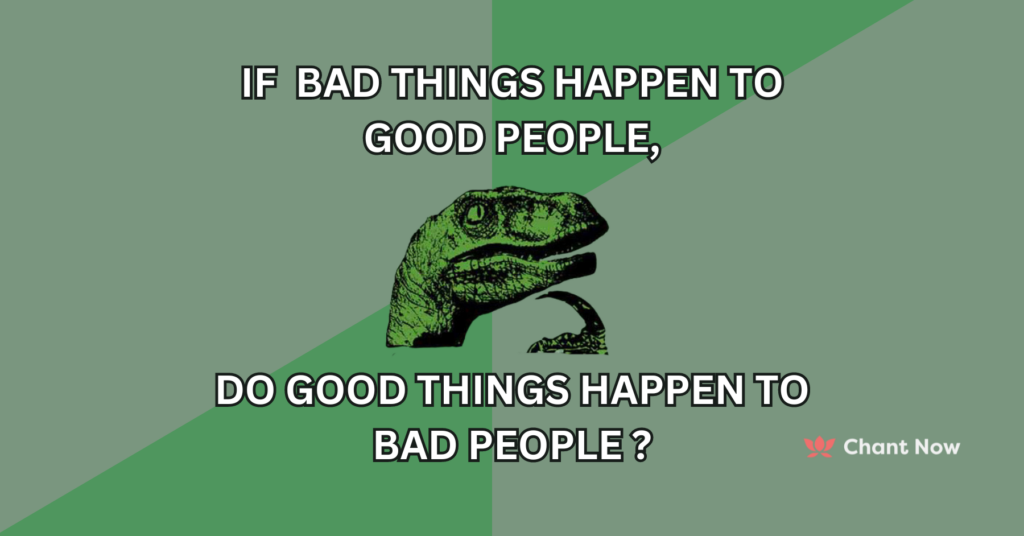Why do bad things happen to good people?

A question commonly asked is, “Why do bad things happen to good people?” If people are good, shouldn’t the universe reward them for their good deeds? What’s the point of being good if bad things continue to happen to you anyway? Why bother? That’s a good question. Karma is a deep and complex science that can be very difficult to understand, and while I don’t claim to be an expert, I will share what I do know about it to help shed some light on this question.
Karma, a concept deeply rooted in Vedic philosophy, is a fundamental principle that governs the workings of the universe. Derived from the Sanskrit word meaning “action” or “deed,” karma encompasses a complex web of cause and effect that transcends individual actions, shaping the course of one’s life and the cosmic order.
The concept of karma finds its roots in the ancient Indian scriptures known as the Vedas, particularly in the Upanishads and the Bhagavad Gita. These texts lay the foundation for understanding the cosmic law of cause and effect and emphasize the interconnectedness of all living beings.
According to Vedic philosophy, every action, thought, and intention sets in motion a chain of events that reverberates throughout the cosmos. The law of karma posits that individuals are responsible for their actions and that the consequences, whether positive or negative, are inexorably linked to the nature of those actions.
The central tenet of karma is the law of cause and effect. It suggests that every action produces a corresponding reaction, shaping the destiny of an individual. Positive actions lead to positive outcomes, while negative actions result in unfavorable consequences. This much is commonly known, but what is not commonly understood is there are reactions that one may experience in this life, showcased by the many instant karma compilation videos you can find on the internet, and there are more long-term reactions that you will experience in another life.
‘…in proportion to the extent of one’s pious or impious actions in this life, one must enjoy or suffer the corresponding reactions of his karma in the next.” -Śrīmad-Bhāgavatam 6.1.41–45
Say you make some bad life choices that cause someone else to suffer. The reaction of those choices may come back to you in your next life, despite being widely considered a good person in that life. This is the short answer for why bad things happen to good people or vice versa. They don’t. Everything that happens is deserved, even though we may not have any memory of what we did to deserve it.
‘The Śrīmad-Bhāgavatam describes in detail how a conditioned living entity takes birth. According to his karma, the living entity is put into the semen of a particular father, and the living entity’s gross material body is manifested from the union of father and mother. During sexual intercourse, the mentalities of the father and mother are combined when the father’s semen and mother’s egg mix, and this combination is acquired by the child.
Each of us has a different type of body: no one’s body is identical to anyone else’s. The different types of bodies have a cause, and that cause is karma. According to one’s previous activities, one develops a certain kind of subtle body – made up of mind, intelligence, and false ego – and on the basis of the subtle body one gets a particular gross body. As Krishna states in the Bhagavad-gītā (8.6):
yaṁ yaṁ vāpi smaran bhāvaṁ
tyajaty ante kalevaram
taṁ tam evaiti kaunteya
sadā tad-bhāva-bhāvitaḥ
“Whatever state of being one remembers when he quits his body, O son of Kuntī, that state he will attain without fail.” The character of the subtle body at the time of death is determined by the sum total of one’s activities during one’s lifetime.’ – A Second Chance chapter 11
This means that our karma can decide what kind of body we get next. Say I am a total glutton in this life. My actions create a future body better suited to my desires than my human body. A body that can eat ravenously, like a pig, or a body with multiple stomachs that need to be fed continuously all day, like a cow. Another example more closely related to the quote above; say I have a wife for whom I am overly attached to. As this body dies, my thoughts go to my wife. As a result, I get the body of a woman in my next life (I may even carry with me an excess of masculine energy with me to that body, either leading me to disassociate with the female body given or a continued attraction to other women, but I’m wondering off topic now).
‘We get different types of bodies among 8,400,000 species according to our karma. Karmaṇā daiva-netreṇa: we work under the influence of material nature contaminated by the three modes, and thus we get a certain type of body according to superior order.’ – Śrīmad-Bhāgavatam 5.9.3
Vedic philosophy introduces the concept of Samsara, the cycle of birth and rebirth. The soul (Atma) undergoes a continuous cycle of reincarnation, moving through various life forms based on the accumulated karma. The goal is to break free from this cycle through spiritual enlightenment and self-realization.
‘In the material world, the living entities are inclined to go astray. The mind and senses generally become attracted to material objects of desire. But one should draw one’s mind to the eternal by the practice of bhakti-yoga. Otherwise, one’s mind and senses will force one to perform karma, activities for personal sense gratification. And as soon as a person engages in sense gratification, he commits sin. Therefore, to avoid karmic activities, which quickly entangle one in the process of repeated birth and death, one must take to the process of Krishna consciousness.’ – A Second Chance chapter 16
Dharma refers to righteous living, aligning one’s actions with moral and ethical principles. Following one’s dharma is seen as a means to accrue positive karma. The Bhagavad Gita, a key scripture in Vedic philosophy, emphasizes the importance of fulfilling one’s duty and responsibilities in accordance with dharma.
- Individual Responsibility: The concept of karma underscores individual responsibility for one’s actions. It empowers individuals to shape their destiny through conscious choices and mindful living.
- Moral and Ethical Living: Living in accordance with dharma and moral principles is considered essential for accruing positive karma. Ethical conduct contributes to personal growth and spiritual evolution.
- Path to Liberation (Moksha): Breaking free from the cycle of birth and rebirth is the ultimate goal of Vedic philosophy. By understanding and transcending the karmic cycle, individuals can attain Moksha, liberation from the material world, and reunification with the divine.
In the vast tapestry of Vedic philosophy, karma serves as a guiding principle that intricately weaves together the fabric of existence. It emphasizes the interconnectedness of all life forms and underscores the importance of conscious, ethical living. By understanding and embracing the cosmic law of cause and effect, individuals can embark on a transformative journey towards spiritual enlightenment and liberation from the perpetual cycle of birth and rebirth.






